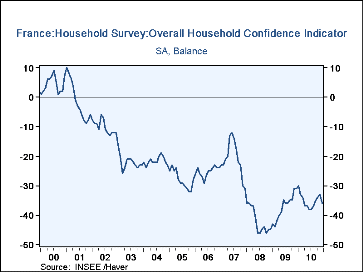 Global| Jan 04 2011
Global| Jan 04 2011Household Confidence Erodes In France
Summary
France's Household confidence indicator had been creeping higher until December. Its backtracking was unexpected. The index made a steady recovery from its low of December 2008 through Jan 2010 then it fell and has since mounted a [...]
 France's Household confidence indicator had been creeping higher until December. Its backtracking was unexpected.
The index made a steady recovery from its low of December 2008 through Jan 2010 then it fell and has since mounted a
recovery from August of this year. Does the drop in December end the recovery process or is this just a minor set-back?
France's Household confidence indicator had been creeping higher until December. Its backtracking was unexpected.
The index made a steady recovery from its low of December 2008 through Jan 2010 then it fell and has since mounted a
recovery from August of this year. Does the drop in December end the recovery process or is this just a minor set-back?
At this point it is hard to tell. The context for the rest of Europe is muddled but the comparisons seem to point more toward the erosion being a more lasting phenomenon for France.
The news around Europe for December has been good at least for the MFG sector. Just today the UK's MFG PMI was up strongly and surprised markets enough to bolster the pound, which is impressive given the weight of the VAT hike that the UK economy faces. Yesterday's Europe wide MFG PMI release found bard increases in the regions MFG PMIs but France was the exception declining in December... along with Greece.
Germany posted a poorer employment result for December than expected as unemployment rose reversing what had been a strong of larger than expected drops in previous months.
Spain reported its first drop in unemployment in a number of months even as it faces added austerity moves including eliminating a stipend for the long term unemployed.
The trends around Europe are not yet clear. The French economy has been performing well but recent efforts by the government to implement austerity have met with hard resistance and widespread protests including public demonstrations. There is some risk of France losing its high sovereign debt rating and not much evidence that it could mount any serious austerity plan to restore its key financial ratios to preserve that rating should it come under review.
The level of confidence in France is quite low and the degree of set-back is substantial from what once had seemed to be a relatively strong recovery from its recession lows. Now France faces a consumer with more fears. Expectations are still that unemployment will drop as that expectation is back down to its level of August 2008. Prices are expected to be on the rise in the future, however. The assessment of the environment for spending is not good. In short France appears to be losing its optimism, and it did not have much to begin with but at least it was improving. No more.
| INSEE Household Opinion Survey | |||||||
|---|---|---|---|---|---|---|---|
| Dec-10 | Nov-10 | Oct-10 | 3-Mo | 6-Mo | 12-Mo | Percentile* | |
| HH Indicator | -36 | -33 | -34 | -34 | -36 | -35 | 9.5% |
| Living Standards | |||||||
| Past 12-Mo | -70 | -65 | -65 | -67 | -67 | -67 | 8.7% |
| Next 12-Mo | -48 | -44 | -44 | -45 | -47 | -46 | 6.3% |
| Unemploy:Next 12Mo | 44 | 45 | 43 | 44 | 50 | 56 | 55.2% |
| Prices | |||||||
| Past 12-Mo | -4 | -10 | -13 | -9 | -12 | -17 | 67.5% |
| Next 12-Mo | -19 | -20 | -23 | -21 | -24 | -29 | 90.5% |
| Savings | |||||||
| Favorable to Save | 24 | 25 | 30 | 26 | 24 | 20 | 59.5% |
| Ability to save 12Mos | -11 | -11 | -10 | -11 | -12 | -10 | 44.0% |
| NSA -Spending: Favorable? | |||||||
| Car Purchase | -79 | -78 | -79 | -79 | -80 | -80 | 4.8% |
| Home Purchase | -90 | -90 | -91 | -90 | -91 | -91 | 6.7% |
| Housing renovation | -57 | -56 | -57 | -57 | -56 | -55 | 68.3% |
| Consumer durables | -11 | -10 | -12 | -11 | -12 | -11 | 16.3% |
| *Over range Since Jan-90 | |||||||
Robert Brusca
AuthorMore in Author Profile »Robert A. Brusca is Chief Economist of Fact and Opinion Economics, a consulting firm he founded in Manhattan. He has been an economist on Wall Street for over 25 years. He has visited central banking and large institutional clients in over 30 countries in his career as an economist. Mr. Brusca was a Divisional Research Chief at the Federal Reserve Bank of NY (Chief of the International Financial markets Division), a Fed Watcher at Irving Trust and Chief Economist at Nikko Securities International. He is widely quoted and appears in various media. Mr. Brusca holds an MA and Ph.D. in economics from Michigan State University and a BA in Economics from the University of Michigan. His research pursues his strong interests in non aligned policy economics as well as international economics. FAO Economics’ research targets investors to assist them in making better investment decisions in stocks, bonds and in a variety of international assets. The company does not manage money and has no conflicts in giving economic advice.






